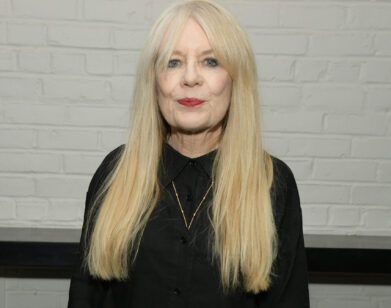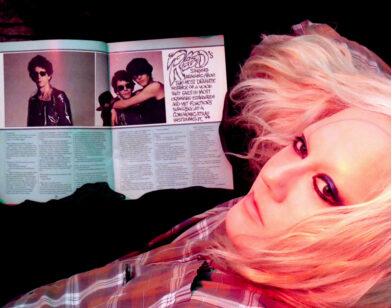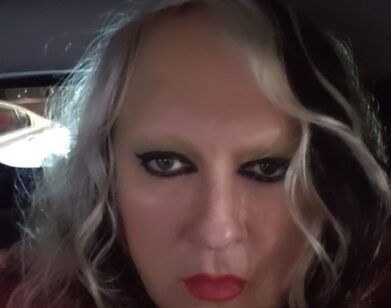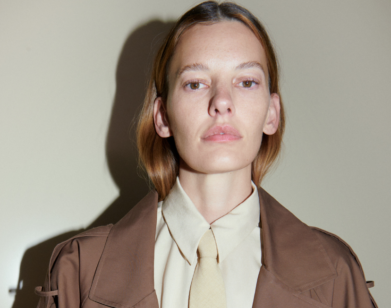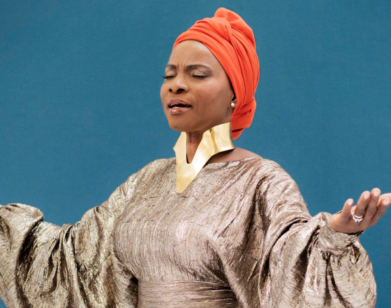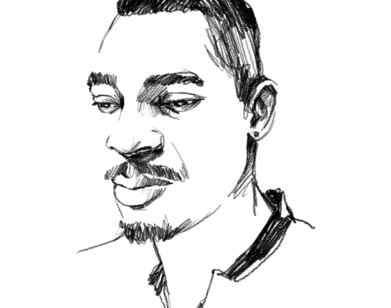ROCK N' ROLL
“We Share a Relentless Curiosity”: David Byrne, in Conversation With Joan as Police Woman
When David Byrne, the iconic founding member of the Talking Heads, sat down with Joan Wasser, better known by her stage name Joan As Police Woman, to talk about her newest album, he came with a surprise. As a gift to her newer listeners, he made a starter pack playlist of Joan’s best work. “If you’re not familiar,” he said, “here’s a place to start.” When Wasser first stormed the rock music scene, she was the violinist for the indie rock-band The Dambuilders. It wasn’t until 1997 that she realized she had a message, and a pretty formidable singing voice,worth sharing. Now, having played as a solo act for the last 17 years, she’s back with her 10th studio album: Lemons, Limes and Orchids, on which Wasser finds herself at her most vulnerable and introspective, awash in the sounds of heavy drum kicks and melancholy piano chords. Ahead of its release, Byrne got together with JAPW to talk about their shared love for ANOHNI, the fight against the bleak news cycle, and why cycling is the superior form of transportation in New York City.
———
DAVID BYRNE: We got to know one another a little bit in the last few years, which was really a happy accident.
JOAN WASSER: Yeah.
BYRNE: We have mutual friends, so that just kind of happened. I wanted to ask about a couple of your new songs. One of my favorites is “Remember the Voice.” There’s a line in there that I can’t remember, but it seems to say, “There’s bumps on the road that I’ve traveled on, and those are what make me who I am.” I wanted to ask more about that idea.
WASSER: Thanks for that question. The line is, “Love is just a word and trouble is the road out of the blue.” I mean, for me, getting myself entangled ultimately leads me into understanding more of who I am. All of the mistakes help me understand myself better, and that leads me to more freedom, ultimately. Getting more of an idea of who other people are is really fun. We share a relentless curiosity, I feel. Do you agree?
BYRNE: I agree. Sometimes there’s failures or dead ends, but it gets you somewhere that you wouldn’t have gotten to otherwise. There’s another song on the new record, the title song, “Lemons, Limes and Orchids,” and there’s a whole story there. I wondered if you could expand on that story. It was when the West Side wasn’t what it is today.
WASSER: I mean, you remember what it used to be like. It was barren. Especially in the ’20s and ’30s and ’40s, it was just deserted in Hell’s Kitchen. This was before cell phones, and I would just get on the train or bike and wander around over there. It was unlikely that I would see anyone I knew and it allowed me to process my thoughts. Now they call it walking meditation, but I was just trying to stay alive and make sense of all of the complications in my mind. So I feel like I processed a lot of stuff over there. All the people that hadn’t figured it out or were just having a hard time were over there slightly zombified trying to find the beauty in the imperfect, seeing all of the refuse on the ground.
BYRNE: Like the lemons, limes, and orchids on the ground.
WASSER: Yeah.
BYRNE: In a song like that, based on a memory, are you starting with the notes or lyrics? Do you write them out as rhymes in a song form or just random thoughts?
WASSER: Typically, I make songs starting with the music, and then the words come from there. But I’m always trying to figure out how to come at writing songs from a different angle. Because every time I write a song, it feels like the first time. I don’t have any template. So I wanted to see if I could start writing songs from words first. I started taking writing courses, and I took an intensive [course] a couple years ago with the great poet Marie Howe. I wrote many of the words that ended up in that song at that workshop.
BYRNE: This is in Ireland?
WASSER: No, this was actually in Rhinebeck. I don’t write in rhyme. It’s pretty free. I was editing a lot, but it starts as throwing memories at the page as they come, trying to just let it out. I wanted to see if I could try to make a sort of epic song, something I’ve really never done, in the shape of a [Bob] Dylan song or a Leonard Cohen song where it’s a lot of verses and a very catchy chorus. I love that music, but I never thought that I was even interested in doing that and I thought, “Let me see what I could do.” So I turned that piece that I wrote at Marie’s into a very, very simple chorus. When I finished the song, I was like, “I’m not sure if I like this.” And then I played it for a couple of my friends and they really responded to it. It’s funny, when things come very quickly, I think, “Shouldn’t it have been harder?”
BYRNE: Yeah, you tend to doubt the value of it when it comes too quickly. But you had words to work from. When you were working with her, did she give you feedback?
WASSER: Yeah. I mean, I wasn’t thinking of it as a song at all at that point. If I was ultimately trying to think of it as a song, I would be less free.
BYRNE: You’ll start to think “Where’s the chorus?”
WASSER: Exactly.
BYRNE: I was also thinking about your singing approach. I think you mentioned years ago that you thought of Al Green as a model. I hear Teddy Pendergrass in there as well, those singers who can really tell a story in a song. Are there any more that you can think of?
WASSER: Wow, thank you. I mean, I love Anne Peebles so much because she’s just so good. She’s never not completely in the song. You feel her insides when she’s singing. It’s right there. I love Nina Simone’s singing because it’s so unaffected. It’s just, “This is me. I’m saying it like it comes out,” which is so liberating because when I first started to sing, when I was a full grown adult, I thought I’d have to affect my voice to make it sound good. I was like, “Oh, I want to sound like Sam Cooke.” Well, you’re not Sam Cooke. So it took me a long time to work out who I was as a singer.
BYRNE: That’s good. Did you start as an instrumentalist, mainly playing violin and keyboards and other things before you thought you could sing?
WASSER: Yeah. I studied classical violin through college. I love playing classical music. It’s so fulfilling, but I didn’t want to be a classical player professionally. I wanted to try to expand the instrument. I wanted to be either a rhythm guitarist or a sound maker. I did that for a while and it was really fun, and then I had some events in my life that were so painful that the violin was no longer enough. I had to sing, which was horrifying because I was surrounded by these amazing singers. I was playing in Antony and the Johnsons. There were so many incredible singers in New York City, and I thought, “What am I doing? What do I have to give?” But I had to. I felt forced to. I felt like I was going to die if I didn’t sing, because it was so much inside that just had to get out. I know that sounds silly, but I really had never thought about how songs were written. I never cared, really. I just started writing and singing and learning what I liked and didn’t like.
BYRNE: When you were teaching yourself guitar and keyboard, were you playing other people’s songs? That’s what I did. Very young, I got songbooks of the pop songs of the day.
WASSER: Yeah. I taught myself both of those instruments, so I do everything probably fairly wrong in light of how you’re supposed to.
BYRNE: And then you worked with all these people: Anohni, Rufus [Wainwright], John Cale, Elton John. Some of those people were you mainly playing violin with as an instrumentalist and—
WASSER: Yes, I was with Rufus. I toured with him for a couple years on the Want One and Want Two tours.
BYRNE: Those are great records.
WASSER: Oh my god, incredible records. I was singing, I was playing violin, and I was playing acoustic and electric guitar. Tour with Rufus was so educational because he’s such a master of texture and tone. That was a seven-piece band, and sometimes it would be seven-part harmony.
BYRNE: Oh my goodness.
WASSER: He would make us switch parts and we would see how it sounded. He would say, “Joan, don’t make it so pretty. Make it more harsh-sounding so it cuts through.” I learned so much touring with him. His music is complicated, so it never got boring. And then I played in Antony and The Johnsons for five years and hearing Anohni and how she emotes through her voice is an absolute education on how to get a song across.
BYRNE: Yeah. Her singing is incredibly emotional. How did those people find you, or how did you find them?
WASSER: With Anohni, I subbed for a violin player. When I walked into the rehearsal, I looked around and I thought, “These are my people.” I instantly felt comfortable. It was a small ensemble. So I subbed, and then I was just in the band for several years. The Rufus gig I had heard through friends. I had met him a few times but at parties. I had recently finished my first EP in 2003, and then we went on the road in February of 2004, so I was opening the shows for him and selling my self manufactured EP. That was an incredible lesson because I was opening solo for people that were there to see Rufus.
BYRNE: That’d be tough.
WASSER: They had no idea who I was. Sometimes people would listen and sometimes it was just everybody talking.
BYRNE: Then it’s just like, “Okay I’m doing a rehearsal for myself. I’m just going to enjoy playing music.”
WASSER: Yeah. We should talk about biking and Ghost Train, and curiosity and solutions.
BYRNE: You have an agenda, okay.
WASSER: We also have to talk about Reasons to be Cheerful. I am so grateful you’re doing that. Tell me what it is exactly.
BYRNE: It’s an online news magazine of what’s called “solutions journalism,” where you report on people who have found solutions to various things out there in the world. It could be anywhere or anybody. I started doing it myself maybe six years ago, before the pandemic. The news cycle was just beating me down. I’m a little bit of a news junkie. I’d read the newspaper in the morning with coffee and get myself all worked up and angry and thought, “This is not good for me, and it’s not going to solve any of these problems.” When I came across something that seemed kind of hopeful, I’d write it down or save it. Then it became more formalized. I hired writers and editors. Now it’s a real thing. We do a story every weekday. All credit to the writers and editors and reporters. They keep finding stuff. I thought they’d run out.
WASSER: We know the news is not all there is, but when we read the news every day, because I do too, it’s mostly about the horrors. But it needs to be balanced with actual reality, which is the amazing things happening around us all the time that have not been deemed newsworthy because they’re not going to get the jolt. It’s not going to bring fear, which is what makes people continue to read.
BYRNE: Yeah, exactly.
WASSER: I subscribe, of course.
BYRNE: Thank you. You’re right, our attention goes to the horrors. We’re just biologically attracted to those things. We need to be aware of dangers, but at the same time, that’s not all there is. The Ghost Train folks, as you know, I’ve been working with them on some songs.
WASSER: I’m so excited about that.
BYRNE: It’s going pretty well. I started writing music in a similar way, not in song form. And then I heard the record of Moondog’s songs that you did. Often, I have to explain to people who Moondog was. I say, “He passed away not too long ago, but he was around in the late ’60s, early ’70s. He dressed as a viking. He was blind. He would hang out by the CBS building on Sixth Avenue. He wrote music.” As a young person, I heard a recording of it and I thought, “This is really cool.” There’s the one song that he did that got sampled all over the place. But the Ghost Train and you and Rufus and some others did a more recent record of new arrangements of that material. I thought it was really nice.
WASSER: Yeah. Just so people know, Ghost Train Orchestra is this small orchestra run by this amazing guy named Brian Carpenter. There’s strings, horns, winds, a full rhythm section with guitar, upright bass. marimba, all sorts of percussion. So they can just do wildly different arrangements of music. They did new arrangements of these Moondog songs, and then we made a record, and David heard it. And then David performed live with us a couple of times, which was such a blast.
BYRNE: A lot of fun and really hard. This stuff is much harder than I thought.
WASSER: Well, what’s so cool about Moondog is that most Western music is in 4/4 or maybe in 6/8, but his music is mostly in 5/4.
BYRNE: I couldn’t handle it.
WASSER: I mean, the song that David chose to sing is in the fastest five I’ve ever heard. The rhythm is so crazy. Another thing we share, I feel like, is obsession with rhythm. We love rhythm.
BYRNE: That song has a great groove, and that’s what drew me to it. And in performing it, I found out it’s a lot harder. The vocals are not hitting where you think they’re going to if you think in four.
WASSER: Yeah. But I really want to talk about bicycling with you. I’m going to say this, cycling has really caught on. There’s so many more bike lanes. David and I have been cycling forever. For me, cycling is the truest form of freedom in New York City. You take a car, you’re going to hit hideous traffic. You take the train, it’ll probably get you there, but it might break down and be late. You cycle, you will likely arrive at the prescribed time. So if you like to have control and freedom, use that bicycle.
BYRNE: I feel the same way. And I can stop whenever. If I see something interesting, I can stop, maybe take a picture of something. I can go into a store, pass a music venue. I still use it as my main means of transportation. New York is pretty flat, except for the bridges, so it’s not that hard.
WASSER: No, it’s not.
BYRNE: Most of the trouble now, especially post-pandemic, there’s drivers who are a little aggressive, and there’s messengers and food delivery people going the wrong way and running red lights, but you can deal with it.
WASSER: Yeah. I feel like it really keeps my senses sharp, because when you’re biking anywhere, but especially in New York, when there’s eight million other people around trying to get places, you literally have to be looking everywhere at all times. And what you said about being able to stop everywhere, we also share an obsession with trees, and we can stop and take photographs of the most magnificent trees in sometimes the most unbelievably unexpected places in New York City.
BYRNE: I’m drawn to the ones where the tree makes these kinds of sensuous shapes, either in the roots or curling around something. I have pictures of ones where the tree has split up and then joined back together again.
WASSER: Yeah.
BYRNE: I want to talk about Fela [Kuti] and Nigerian music. You did a collaboration with Tony Allen. I never saw him perform live, but I saw him play with other people, and one of the things that surprised me was how light his touch was. I thought, “He’s driving this huge group, but he’s kind of playing around and he’s not trying to do it with power.”
WASSER: So true. His style of playing is outrageous, right? First of all, he is so relaxed. He is just hanging out, and he’s literally the coolest musician I’ve ever watched. Nobody’s ever been cooler. If you look away, you would have some idea of what that person would look like. And then you look at him and he’s dancing very, very softly and sensually with those drums. He’s outrageous, that person. I will be grateful for the rest of my life I got to work with him. We met in 2019, hit it off. We’re just like, “Where have you been all my life?” We realized we were born almost the same day, 30 years apart. I heard myself say, “Would you be up for recording?” He was like, “Yeah, man, let’s do it.” Score. I didn’t want to be one of those people that wrote songs and then had Tony Allen play on my song so that it sounded cooler. I wanted to make music from the start with him. I brought my friend Dave Okumu over from London to play bass when I was on a solo tour in 2019. We went into the studio and we just jammed. And then the pandemic hit and I was stuck inside, and I had those jams. I started writing from them and chopping everything. It was a project that I never could do now, because there wouldn’t be time. I was working 16 hours a day, cutting and changing all the base notes and moving them around. And then at the very top of the pandemic, he passed away. I was listening to his drums when I heard that.
BYRNE: So he never heard the finished thing?
WASSER: No. He would text me and say, “How’s it going? I want to hear what’s happening.” I hadn’t started working on it yet. I was like, “Tony, I’m just still listening to what we were doing.” He is like, “Okay. Keep me posted.” He was very excited. He was a very curious person and very interested in doing things he hadn’t done before, which kept him looking like he was 12 years old.
BYRNE: Did he talk about his years with Fela?
WASSER: He did. They were very difficult. Fela was a very difficult person and very tyrannical.
BYRNE: Yeah.
WASSER: Tony talked about that very openly, and then also said, “I would never take back my time with him because I learned so much.” Fela did really vindictive stuff to Tony, like would turn his drums almost inaudible on the recordings if he was mad at him for some stupid reason. He just really seemed awful but also really inspired, and Tony seemed to really understand that. Even though Fela was personally attacking Tony, he’s like, “I know it’s not really about me.” Good way to live.
BYRNE: Anyway, you have a tour coming up?
WASSER: I do. I have a tour in Europe from October 3rd to November 6th.
BYRNE: After Europe, are you going to do shows here in the US?
WASSER: I have a record release show at National Sawdust on December 13th. Will you be around?
BYRNE: December? Yes, let me just put it in my calendar.
WASSER: Okay. You’re on the list.


